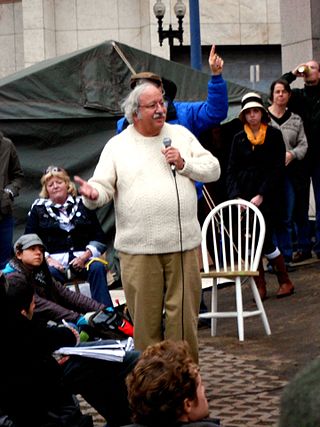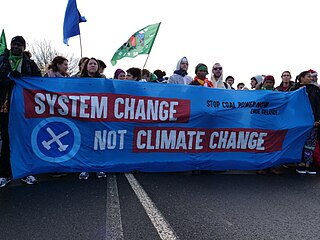Related Research Articles

A social movement is a loosely organized effort by a large group of people to achieve a particular goal, typically a social or political one. This may be to carry out a social change, or to resist or undo one. It is a type of group action and may involve individuals, organizations, or both. Social movements have been described as "organizational structures and strategies that may empower oppressed populations to mount effective challenges and resist the more powerful and advantaged elites". They represent a method of social change from the bottom within nations.
The Movement for a New Society (MNS) was a U.S.-based network of social activist collectives, committed to the principles of nonviolence, who played a key role in social movements of the 1970s and 1980s.
Bill Moyer was a United States social change activist who was a principal organizer in the 1966 Chicago Open Housing Movement. He was an author, and a founding member of the Movement for a New Society.

Community organizing is a process where people who live in proximity to each other or share some common problem come together into an organization that acts in their shared self-interest.
Social movement unionism (SMU) is a trend of theory and practice in contemporary trade unionism. Strongly associated with the labour movements of developing countries, social movement unionism is distinct from many other models of trade unionism because it concerns itself with more than organizing workers around workplace issues, pay and terms and conditions. It engages in wider political struggles for human rights, social justice and democracy. Social movement unionism grew out of political struggles in developing countries and was theorized as a distinct industrial relations model in the late 1980s and early 1990s.
Prefigurative politics are the modes of organization and social relationships that strive to reflect the future society being sought by the group. According to Carl Boggs, who coined the term, the desire is to embody "within the ongoing political practice of a movement [...] those forms of social relations, decision-making, culture, and human experience that are the ultimate goal". Besides this definition, Leach also gave light to the definition of the concept stating that the term "refers to a political orientation based on the premise that the ends a social movement achieves are fundamentally shaped by the means it employs, and that movement should therefore do their best to choose means that embody or prefigure the kind of society they want to bring about". Prefigurativism is the attempt to enact prefigurative politics.

Community Change, formerly the Center for Community Change (CCC), is a progressive community organizing group active in the United States. It was founded in 1968 in response to civil rights concerns of the 1960s and to honor Robert F. Kennedy. The organization's stated mission is "to build the power and capacity of low-income people, especially low-income people of color, to change their communities and public policies for the better."

"People Power" is a political term denoting the populist driving force of any social movement which invokes the authority of grassroots opinion and willpower, usually in opposition to that of conventionally organised corporate or political forces. People power protest attempts to make changes in the political process of a given state - it refers to “revolutions driven by civil society mobilisation” which result in a reconfiguration of political power in a given state. As denoted by the name, this method is reliant on popular participation “civilian-based” and therefore does not include isolated acts or protest without an overarching organisation by a group of people. People power can be manifested as a small-scale protest or campaign for neighborhood change; or as wide-ranging, revolutionary action involving national street demonstrations, work stoppages and general strikes intending to overthrow an existing government and/or political system. With regards to tactics employed by People Power movements, both nonviolence and violence have been used throughout history: as was the case in the non-violent 1986 Philippines revolution which overthrew the Marcos régime, or the violent uprising in Libya in 2011.
The International Center on Nonviolent Conflict is an independent, nonprofit educational foundation, founded by Jack DuVall and Peter Ackerman in 2002. It promotes the study and utilization of nonmilitary strategies by civilian-based movements to establish and defend human rights, social justice and democracy.
Political opportunity theory, also known as the political process theory or political opportunity structure, is an approach of social movements that is heavily influenced by political sociology. It argues that success or failure of social movements is affected primarily by political opportunities. Social theorists Peter Eisinger, Sidney Tarrow, David S. Meyer and Doug McAdam are considered among the most prominent supporters of the theory.
The North American Conference of Homophile Organizations was an umbrella organization for a number of homophile organizations. Founded in 1966, the goal of NACHO was to expand coordination among homophile organizations throughout the Americas. Homophile activists were motivated in part by an increase in mainstream media attention to gay issues. Some feared that without a centralized organization, the movement would be hijacked, in the words of founding member Foster Gunnison Jr., by "fringe elements, beatniks, and other professional non-conformists".

Marshall Ganz is the Rita T. Hauser Senior Lecturer in Leadership, Organizing, and Civil Society at the Kennedy School of Government at Harvard University. Introduced to organizing in the American civil rights movement, he worked on the staff of the United Farm Workers for sixteen years, became trainer and organizer for political campaigns, unions and nonprofit groups, and returned to Harvard where he earned his PhD in Sociology (2000). He is credited with devising the successful grassroots organizing model and training for Barack Obama’s winning 2008 presidential campaign.
Networked advocacy or net-centric advocacy refers to a specific type of advocacy. While networked advocacy has existed for centuries, it has become significantly more efficacious in recent years due in large part to the widespread availability of the internet, mobile telephones, and related communications technologies that enable users to overcome the transaction costs of collective action.

Social movement impact theory is a subcategory of social movement theory, and focuses on assessing the impacts that social movements have on society, as well as what factors might have led to those effects.

After Capitalism: Economic Democracy in Action is a 2012 book by United States author Dada Maheshvarananda, an activist, yoga monk and writer. The book argues that global capitalism is terminally ill because it suffers from four fatal flaws: growing inequity and concentration of wealth, addiction to speculation instead of production, rising unsustainable debt and its tendency to exploit the natural environment.
The Centre for Applied Nonviolent Action and Strategies(CANVAS) is a non-profit, non-governmental, educational institution focused on the use of nonviolent conflict, based in Belgrade, Serbia. It was founded in 2004 by Srđa Popović and the CEO of Orion Telecom, Slobodan Đinović. Both were former members of the Serbian youth resistance movement, Otpor!, which supported the overthrow of Slobodan Milošević in October 2000. Drawing upon the Serbian experience, CANVAS seeks to educate pro-democracy activists around the world in what it regards as the universal principles for success in nonviolent struggle.
Anti-corporate activism is activism directed against the private sector, particularly larger corporations. It is premised on the belief that the activities and impacts of big business are detrimental to the good of the public and democratic process.

The climate movement is a global social movement focused on pressuring governments and industry to take action addressing the causes and impacts of climate change. Environmental non-profit organizations have engaged in significant climate activism since the late 1980s and early 1990s, as they sought to influence the United Nations Framework Convention on Climate Change (UNFCCC). Climate activism has become increasingly prominent over time, gaining significant momentum during the 2009 Copenhagen Summit and particularly following the signing of the Paris Agreement in 2016.
George Russell Lakey is an activist, sociologist, and writer who added academic underpinning to the concept of nonviolent revolution. He also refined the practice of experiential training for activists which he calls "Direct Education". A Quaker, he has co-founded and led numerous organizations and campaigns for justice and peace.
Undongkwon or Undonggwon, which refers to "the movement sphere" in Korean, is a term associated with the Minjung movement in South Korea during the 1970s and the 1980s. The Minjung movement was a social movement that recognized the people who were culturally and systematically neglected by the South Korean government for economic advancement. The term, Undongkwon, is also understood as a "counter public sphere," which is an environment where Minjung movement activists can plan their beliefs and ideals against the commonly accepted belief systems. Alternatively, Undongkwon is conceptualized to include the individuals and any activists who were involved. They believed in laws and social movements which would prioritize helping the common person or citizen above all other governmental focuses. In addition to a strong alliance with laborers, they had an equal devotion to community which began the opposition to western culture and the South Korean government. At this revolutionary time, there were many mobilized groups against the South Korean public agenda such as student movements, visual arts movements Madanggŭk and labor movements.
References
- ↑ Rose, Anna (2012). "Bill Moyer's Movement Action Plan". Commons Social Change Library. Retrieved 2022-06-16.